Have fun with kids in the kitchen and teach them how to make simple dishes with these educational kids cooking activities.
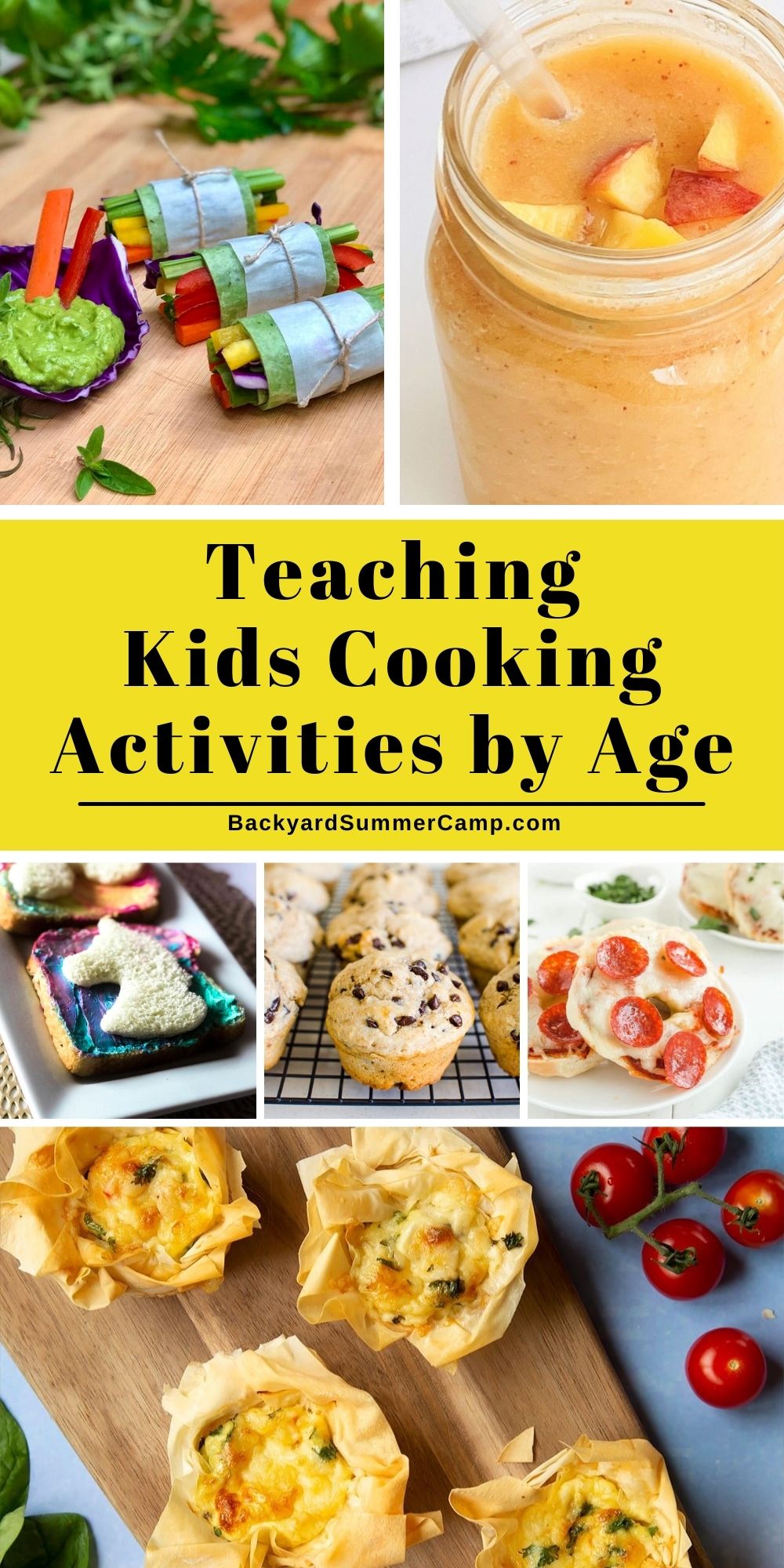
Disclosure: As an Amazon Associate and member of other affiliate programs we earn from qualifying purchases. Read more.
Do your kids help you in the kitchen? If not, you might be surprised to learn that even toddlers can start learning basic cooking skills. Plan a few of these activities to introduce your children to cooking essentials.
When kids are doing cooking activities, they’re learning how to cook, of course, but also so much more:
- Motor skills and hand-eye coordination
- Where food comes from
- Nutrition and healthy habits
- Planning and organizing
- Responsibility
- Cleaning
Note that while we’ve organized the activities below by age, you know your child best and can decide which activities are appropriate. We consulted BBC Good Food and the US Academy of Nutrition and Dietetics, but this isn’t an exhaustive list of tasks that kids can do at each age.
Of course, kitchen safety is a must, so always supervise your kids, especially around anything hot or sharp!
Everyone cooking should wash their hands thoroughly and practice food safety. Keep raw meat (and knives, cutting boards, etc. that have touched raw meat) away from other foods. Avoid double-dipping and keep your workspace clean.
Become a Happy Camper!
Sign up to receive our monthly email newsletter
and get a free printable 30 Day Reading Calendar!
Toddler cooking activities
Toddlers will only be able to do the simplest tasks and won’t have much of an attention span.
Wash fruits and veggies
Toddlers can wash raw fruits and vegetables in the kitchen sink with cool water.
- As the name implies, The Carrot Underground’s vegan veggie rainbow wraps are full of colorful vegetables for your child to practice washing.
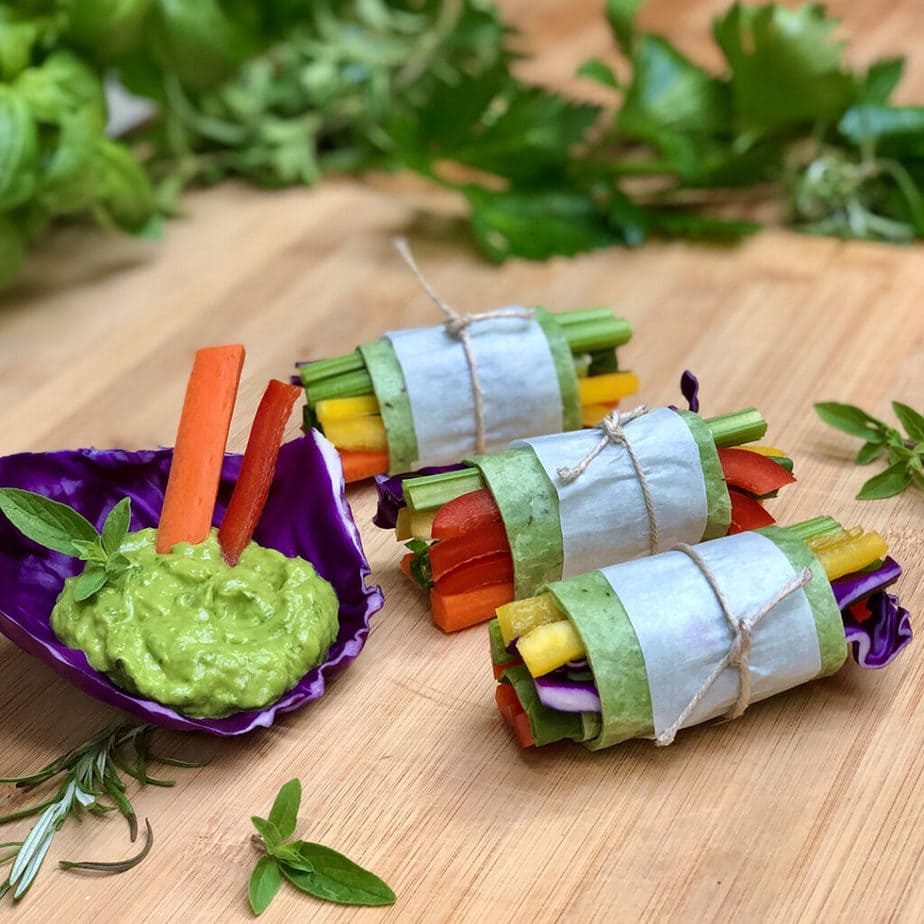
Scooping and sprinkling
Give your tot a spoon and let them help you scoop ingredients into a measuring cup. Keep a close eye and don’t be surprised if it gets as messy as playtime with a sensory bin.
- Not only do these oatmeal chocolate chip bars at Thrifty Frugal Mom have plenty of ingredients to measure, they’re also a quick recipe to make at snack time!
Mixing and mashing
Kids at this age can learn the basics of stirring a bowl with a spoon or mashing soft ingredients with a fork.
- Make a batch of healthy chocolate chip muffins at iFOODreal and let your toddler help mix the batter.
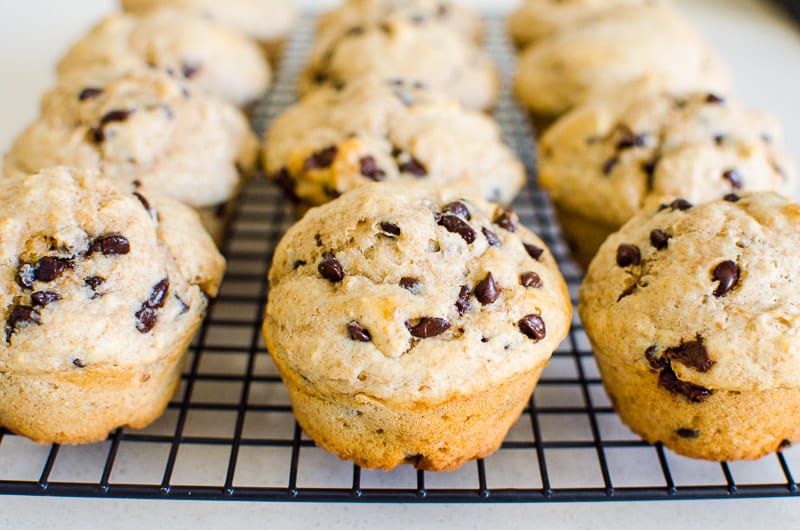
Age 3-5 cooking activities
Kids age 3-5 can learn toddler tasks and may be able to follow instructions.
Measuring ingredients
Preschoolers can use measuring spoons and cups with close supervision. Show them exactly how to scoop the ingredients and level the top of the spoon.
- What could be more fun to measure than sprinkles? Try some funfetti cookies with Wondermom Wannabe.

Cutting and tearing soft ingredients
Ingredients that don’t need to be cut with a sharp knife are perfect. Try letting your child tear lettuce or cut soft butter with a butter knife.
- Try these pepperoni rolls from On My Kids Plate and have kids stretch and cut the dough into pieces.
Rolling and shaping
Baking is a great way to practice rolling out dough, using plastic cutters, and shaping bread and cookies.
- Making this unicorn bread from Vanah Lynn is a fun way to practice using cookie cutters!
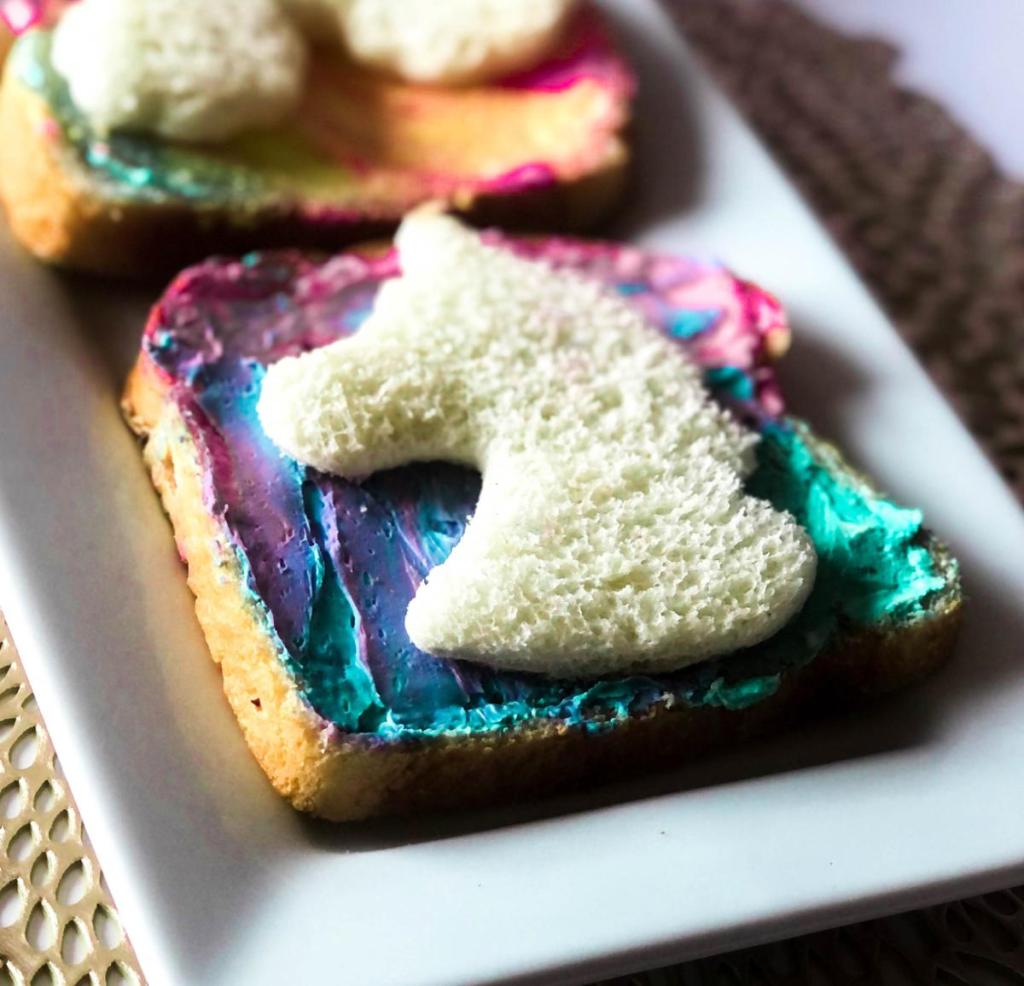
Spreading
With close supervision, your child can practice spreading butter, jam, frosting, etc. Remind them not to lick the spatula or their fingers while cooking.
- Little Sunny Kitchen’s ham and cheese roll ups are quick to make, so your child can spend time spreading the cream cheese filling.
Age 5-7 cooking activities
School-aged kids are ready to learn more complex tasks.
Cutting with scissors
Keep a pair of kid scissors in the kitchen that is just for cooking so your 5 to 7-year-old can help open packages or snip herbs.
- Make this one pot cream lemon chicken at Little Sunny Kitchen and have kids snip the parsley for the garnish.
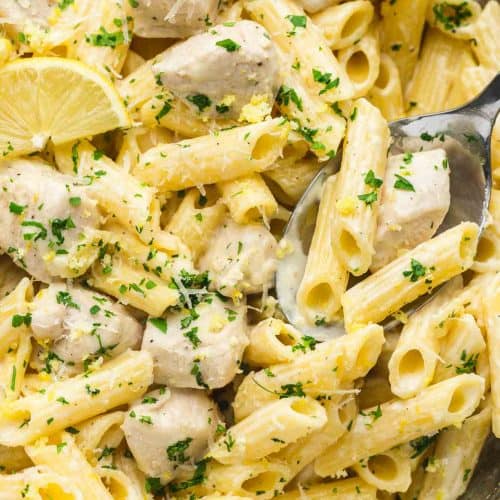
Peeling
Kids at this age can begin using a vegetable peeler with the same safety guidelines as a knife.
- Try making vegetable soup, like Hide the Chocolate, who was inspired by the adorable book “Despereaux.”
Cutting with a knife
When your child is ready to learn how to cut with a knife, start with a plastic one and teach them how to hold the knife and keep their fingers safe.
- Most fruits are soft enough for beginning cutting skills, like the ones for these rainbow fruit skewers by Simply Life by Bri.

Setting the table
While you probably don’t want to hand over the good china, now is a great time to let your child set the table. They can practice counting dishes, knowing which utensils to set out (“remember you need a spoon for soup”), and finding condiments in the refrigerator.
- Education Possible has a great guide for teaching kids how to set the table – and tricks to help them remember where each item goes.
Grating
Your child can grate cheese and vegetables using a grater. Don’t let them grate too close to the end of the ingredient and supervise to avoid grating fingertips.
- Make a batch of quick and easy pizza bagels, via Fantabulosity, and have kids grate the cheese.
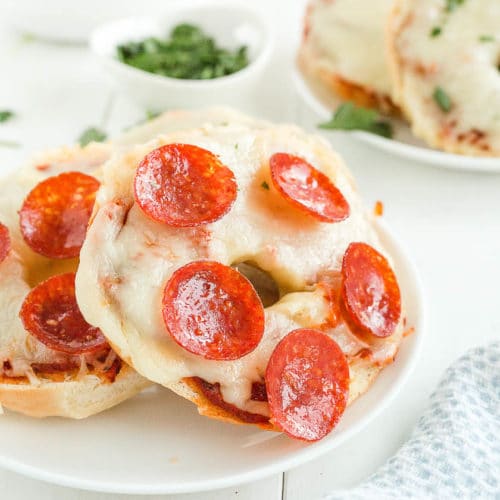
Age 8-11 cooking activities
Once children have learned the skills for younger ages, they can take on increased responsibilities.
Whisking
Kids with some practice mixing other ingredients can move on to whisking messier foods like eggs or whipped cream.
- Pudding dirt cups are perfect for teaching whisking and Simply Full of Delight says her 9-year-old can make this recipe on her own.
Cooking with heat
This age range is a good time to introduce the microwave, oven, and stovetop. Show them step-by-step how to use the appliance as well as how to be safe using it.
- Kids are more likely to eat a vegetable if they helped cook it, so introduce your child to steamed broccoli in the microwave via Recipe This.
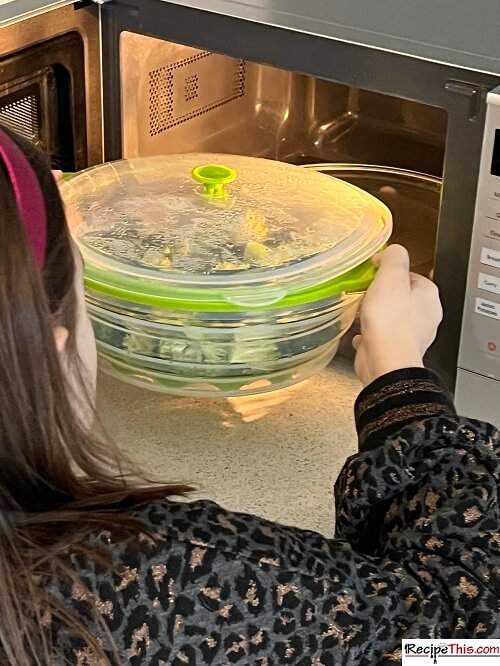
Opening cans
Between ages 8 and 11, your child should be able to open a can with a can opener. Remind them that the edges of open cans can be sharp.
- Courtney’s Sweets has a fun recipe for making quesadillas with kids. To practice opening a can, just add some drained and rinsed beans to your ingredients!
Following a simple recipe
After some time learning in the kitchen with you, your child will be able to follow a simple recipe from beginning to end. Choose something that you make often that has only a few steps to help build confidence.
- Kids can practice measuring, mixing, using several appliances to make these peanut butter banana muffins at The Copper Table.

Planning a meal
Younger kids may be able to help you make a grocery list and remind you of items that have run out. At age 8-11, let your child plan a whole meal by choosing the menu and making a list of the ingredients you need to purchase.
- Harvard has a cute kid-friendly version of the USDA food pyramid that’s called the kid’s healthy eating plate, perfect for choosing the foods for a meal.
Age 12+ cooking activities
Tweens and teens still need some supervision in the kitchen, but as they master all the other skills, your kids can try making more complicated recipes.
Using kitchen appliances
Kids who have learned the basics can also begin using other appliances like a food processor, blender, and slow cooker or pressure cooker.
- Whip up a peach smoothie with Ginger Divine for an introduction to using the blender.
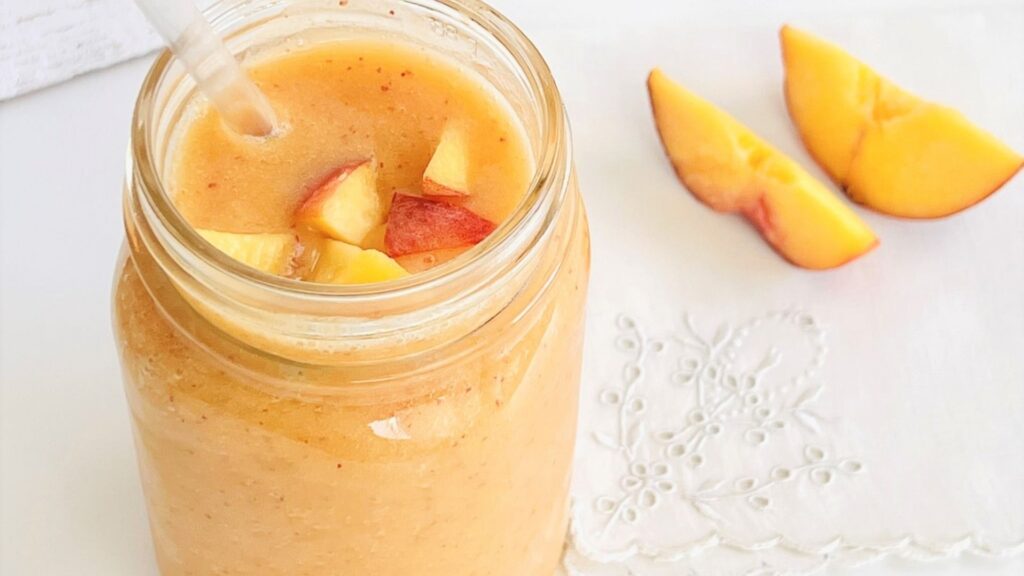
Tasting a recipe to add seasoning
Once your child has an appropriate understanding of food safety, they will know when it’s safe to taste a recipe and how to add seasoning based on taste.
- Homemade popcorn is a great snack that can be flavored in lots of ways, like this guide from Greedy Girl Gourmet.
Cooking with less supervision
As you and your child are comfortable with their skills in the kitchen, you can supervise less. Let them take the lead on cooking and you become their assistant.
- These mini phyllo pastry quiches from A Mummy Too are a great way for your child to practice the skills they have learned.

Teaching your child how to cook is a process. It will take some time and things are going to get messy. Remember to have fun with it! Plan to cook one meal per week, or set aside a whole week in the summer to have your own mini cooking camp at home with several kids cooking activities.
Plan your summer with the DIY Summer Camp Planner!
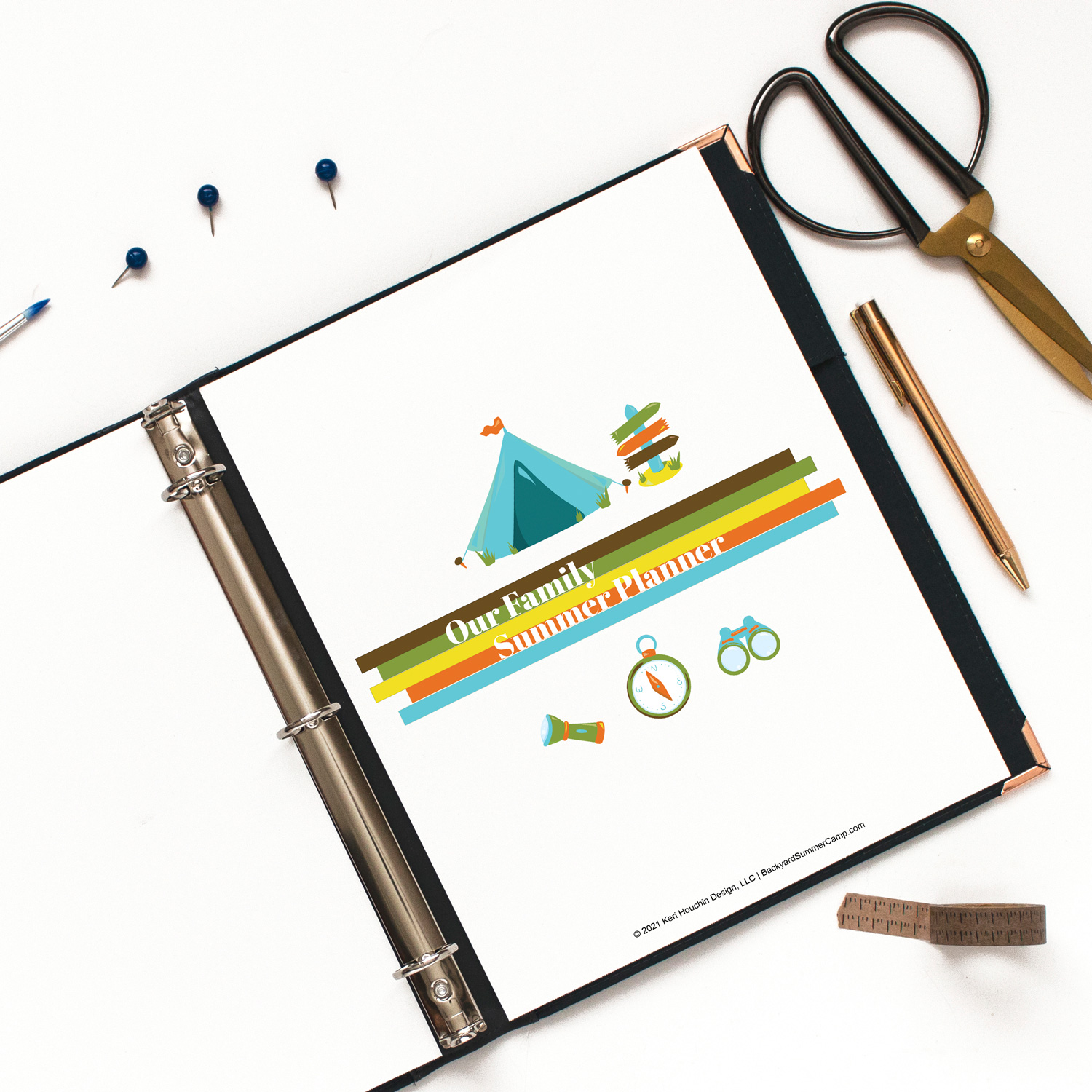
Our step-by-step guide will help you organize a day, a week, or a whole summer of fun activities for your kids.

